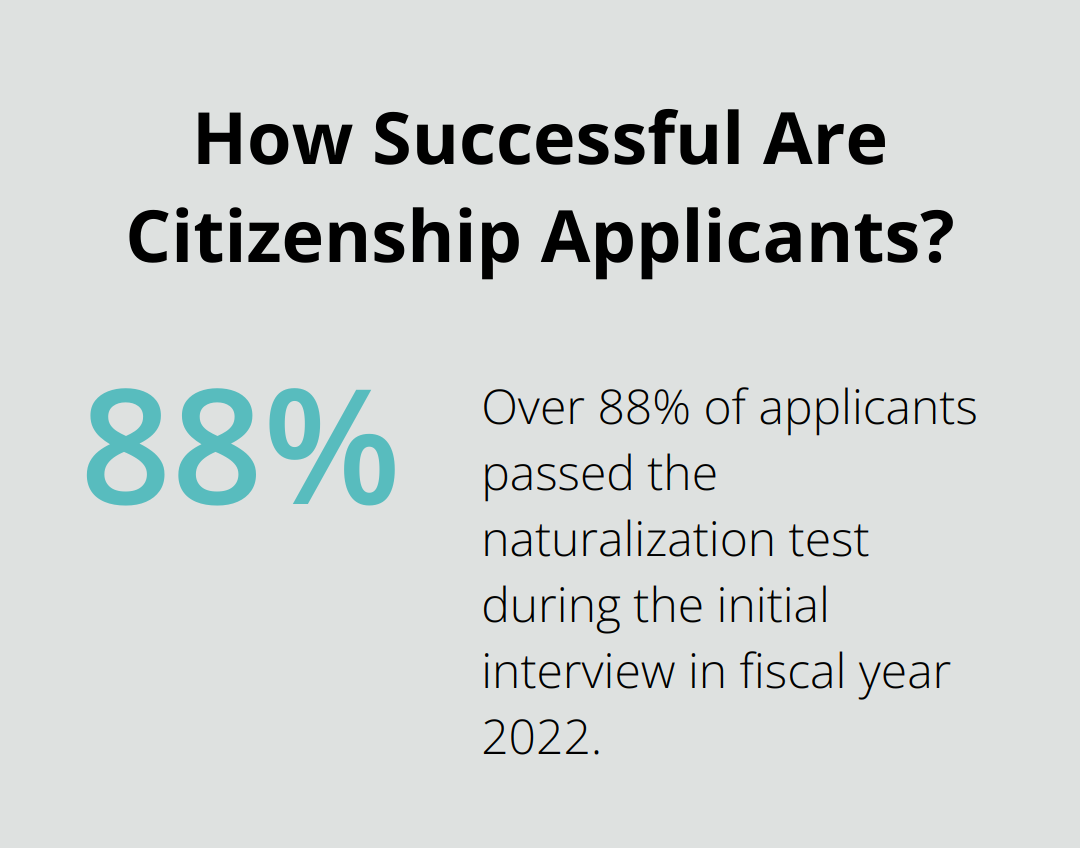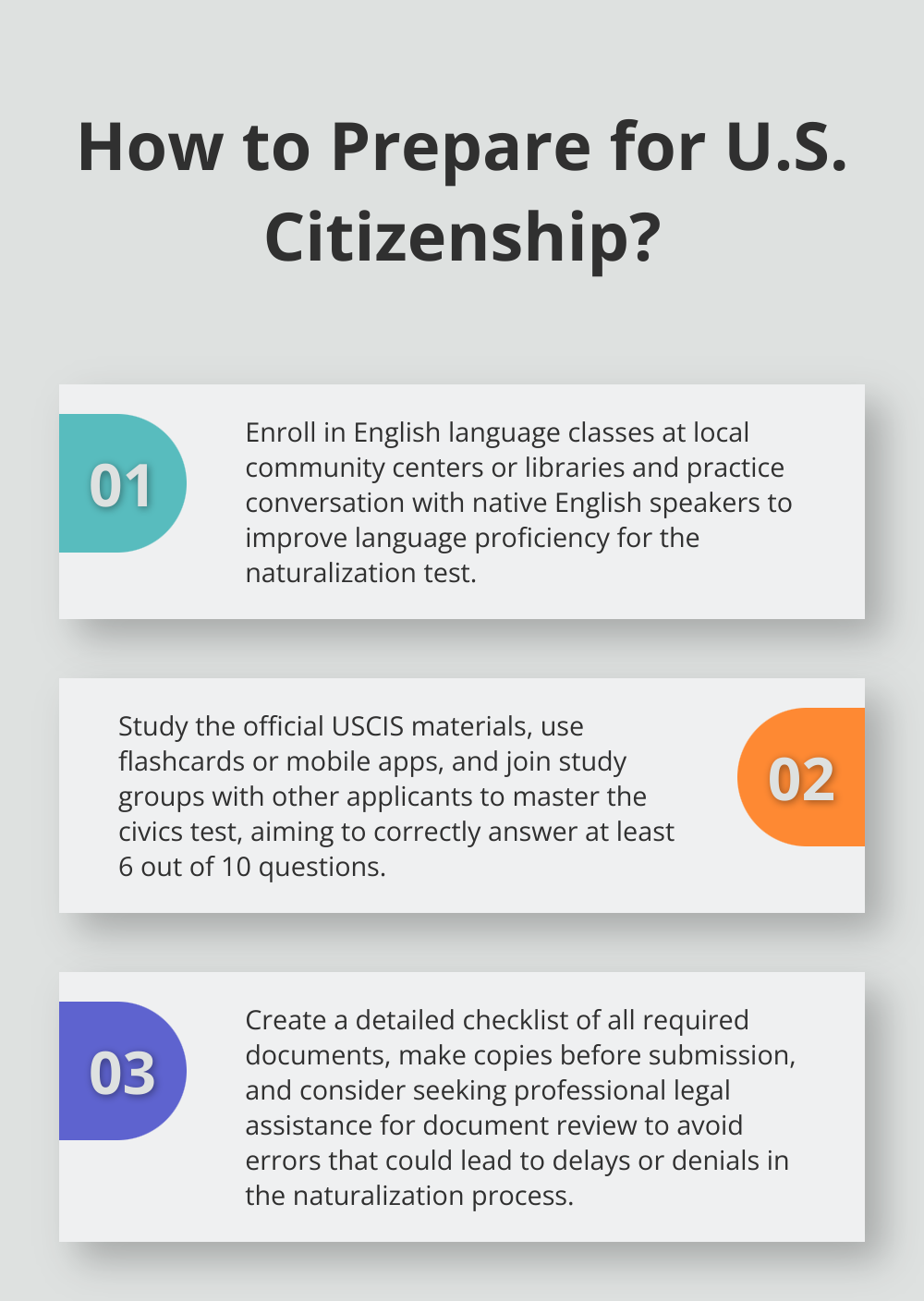
Easiest Paths to Citizenship by Naturalization
Becoming a U.S. citizen through naturalization is a life-changing journey. At Law Offices of Jeffrey A. Thompson, we often guide clients through the easiest paths to citizenship by naturalization.
This blog post will explore the fastest routes to obtain U.S. citizenship, common challenges in the process, and how to overcome them. We’ll provide practical insights to help you navigate this complex but rewarding journey.
What is Naturalization?
Naturalization transforms foreign nationals into U.S. citizens through a legal process. This chapter explores the key requirements, steps, and benefits of becoming a naturalized American citizen.
Key Requirements for Naturalization
To qualify for naturalization, applicants must meet several criteria:
- Age: At least 18 years old
- Residency: Lawful permanent resident status for at least five years (or three years if married to a U.S. citizen)
- Character: Demonstration of good moral character
- Language: Pass an English language test
- Civics: Pass an exam covering U.S. history and government

In fiscal year 2023, U.S. Citizenship and Immigration Services (USCIS) welcomed 878,500 new citizens during naturalization ceremonies held across the United States and around the world. This statistic highlights the significant number of immigrants who commit to fully integrating into American society each year.
The Naturalization Process
The path to naturalization involves several steps:
- Application: File Form N-400 (Application for Naturalization) with USCIS
- Biometrics: Undergo fingerprinting and background checks
- Interview: Attend a meeting with a USCIS officer to assess eligibility, English proficiency, and civics knowledge
As of May 2024, the median processing time for naturalization applications stood at five months. This marks a substantial improvement from the 11.5-month wait time reported in fiscal year 2021.
Benefits of U.S. Citizenship
Naturalization offers numerous advantages to new citizens:
- Voting Rights: Participate in federal elections
- Employment Opportunities: Eligibility for certain federal jobs
- Family Reunification: Easier petitioning for family members to immigrate
- Protection from Deportation: Enhanced legal status and rights
- Travel Freedom: Unrestricted ability to leave and re-enter the U.S.
Economically, naturalization often leads to improved opportunities.
As we move forward to explore the fastest routes to U.S. citizenship, it’s important to understand that while the naturalization process can seem complex, the benefits it offers make it a worthwhile pursuit for many immigrants.
Fast-Track Paths to U.S. Citizenship
Marriage to a U.S. Citizen
An applicant applying for naturalization under INA 316, which requires 5 years of continuous residence, must wait at least 4 years and 1 day after becoming a permanent resident before filing for naturalization. USCIS scrutinizes these applications closely to prevent fraud. Couples must provide extensive evidence of a bona fide marriage (including joint financial records, shared living arrangements, and photos documenting their relationship).

The marriage must remain intact throughout the naturalization process. If the couple divorces before the immigrant spouse becomes a citizen, the expedited path is no longer available. In fiscal year 2023, approximately 291,100 individuals naturalized through this route, making it one of the most common fast-track options.
Military Service
U.S. military service offers one of the quickest paths to citizenship. Service members can apply for naturalization immediately upon joining the military, without waiting for the usual residency period. This applies to both peacetime and periods of hostility.
During peacetime, one year of honorable service is required before applying. However, during designated periods of hostility, service members can apply for citizenship on day one of their service. In fiscal year 2023, over 12,100 foreign-born military members naturalized through this program.
The military route also waives certain fees and expedites the application process. However, applicants must still meet other naturalization requirements, including good moral character and passing the English and civics tests.
Citizenship Through Parents
Children born abroad to U.S. citizen parents may automatically acquire citizenship at birth, depending on the parents’ circumstances. This is known as derivative citizenship. In some cases, children may also derive citizenship when their parents naturalize.
For children born abroad to one U.S. citizen parent, the citizen parent must have resided in the U.S. for at least five years (with at least two of those years after the age of 14), prior to the child’s birth. If both parents are U.S. citizens, only one needs to have resided in the U.S. prior to the child’s birth.
The rules for derivative citizenship have changed over time. The law in effect at the time of the child’s birth or the parents’ naturalization determines eligibility. This can make determining citizenship status complex, often requiring expert legal guidance.
These fast-track paths to citizenship offer significant advantages, but they also come with unique challenges and requirements. The next chapter will explore common obstacles that applicants face during the naturalization process and provide strategies to overcome them.
Overcoming Naturalization Challenges
The path to U.S. citizenship through naturalization presents several obstacles. Understanding these common hurdles can help you prepare and increase your chances of success.
English Language Proficiency
One of the most significant barriers for many applicants is the English language requirement. USCIS requires applicants to demonstrate the ability to read, write, speak and understand English.

To overcome this challenge, we recommend:
- Enrolling in English language classes at local community centers or libraries
- Using free online resources (such as USA Learns or Duolingo)
- Practicing conversation with native English speakers
- Reading English-language newspapers and watching English-language news broadcasts
Civics Test Mastery
The civics test, which covers U.S. history and government, can intimidate many applicants. You must correctly answer 6 out of 10 questions from a pool of 100 possible questions. The civics test pass rate is impressive, with 95.7% of all applicants passing the naturalization test. In fiscal year 2022, over 88% passed it during the initial interview.
Effective preparation strategies include:
- Studying the official USCIS study materials
- Using flashcards or mobile apps to quiz yourself regularly
- Watching educational videos on U.S. history and government
- Joining study groups with other naturalization applicants
Document Complexity
Gathering and correctly submitting all required documents is essential. Common errors include incomplete applications, missing supporting documents, or outdated forms. These mistakes can lead to delays or even denials.
To avoid documentation pitfalls:
- Create a checklist of all required documents
- Double-check that all information is accurate and up-to-date
- Make copies of all documents before submission
- Consider seeking professional legal assistance for document review
Processing Time Management
While USCIS has reduced processing times, backlogs can still occur. As of May 2024, the median processing time for naturalization applications was five months (a significant improvement from previous years). However, individual cases may take longer.
To manage processing times:
- Apply well in advance of any planned travel or life events
- Use the USCIS online case status checker for updates
- Consider requesting expedited processing if you qualify (e.g., military deployment, severe financial loss)
These challenges require patience, preparation, and often, professional guidance. The Law Offices of Jeffrey A. Thompson specializes in helping clients overcome these hurdles, ensuring a smoother path to U.S. citizenship. Our expertise can be particularly valuable in complex cases or when facing unexpected obstacles in the naturalization process.
Final Thoughts
The easiest citizenship by naturalization paths include marriage to a U.S. citizen, military service, and citizenship through parents. These options can reduce waiting times and simplify the process for eligible individuals. However, the naturalization process remains complex and demanding, requiring careful preparation and attention to detail at every step.

Professional legal guidance plays a vital role in navigating the intricacies of immigration law and policy. Law Offices of Jeffrey A. Thompson specializes in guiding clients through the naturalization process, providing tailored assistance for various application routes. Our team supports clients in overcoming common challenges, such as language barriers and document preparation.
U.S. citizenship offers numerous benefits, including voting rights, job opportunities, and family reunification. The Law Offices of Jeffrey A. Thompson can help you navigate the process with confidence and increase your chances of success (from initial consultations to final oath ceremonies). Our compassionate and dedicated approach to immigration law can make a significant difference in your path to becoming a U.S. citizen.


